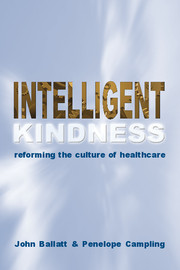Foreword
Published online by Cambridge University Press: 01 January 2018
Summary
This is a generous book, as befits its subject. It is generous in at least three ways: it explains important ideas in an open and understandable language; it explores theories that are actually useful in thinking about how we care for others; and it offers some comfort for those who work at a difficult time for public services and those (all of us in the end) who need these services.
It is also a whistleblower of a book. Not that it makes sensational accusations or revelations about the unintended cruelties of our health systems; there has been a succession of surveys, reports and inquiries which have done that for us, if we will only take note. This book does something else: it helps us to listen to what we know – from those reports as well as from our own experience – about the difficulties of responding with ordinary kindness to the distress of others. It helps us to overcome our indifference, to face up to the need to do better according to the demands of our humanity.
Who are ‘we’? Clinicians, managers, regulators, policy analysts, leaders and followers in the delivery of services to people, when they are at their most vulnerable, when they are sick, distressed, lacking the capacity to look after themselves in a society that rewards enterprise and opportunity and responds to dependency with fear and anxiety.
It is difficult to talk about kindness, an ordinary quality caught up in the technological claptrap. Not sentimental. Not clever. Not easy to audit. As Michael Morpurgo said in his 2011 Richard Dimbleby lecture on the needs of children, you cannot have a league table of relationships. Being with patients, clients, service users can be very hard work. If we deny that as a fact, we are in trouble, because then we build our defences against the difficulty of the work. We try not to feel the pain of the other or our own pain in responding. We have protocols and procedures, form-filling and training days. But this book poses a question for all of us to answer in our own way: how we do things, our practices and systems, are they helpful or are they hindrances to our capacity to show kindness in our relationships?
- Type
- Chapter
- Information
- Intelligent KindnessReforming the Culture of Healthcare, pp. iv - viPublisher: Royal College of PsychiatristsPrint publication year: 2011



